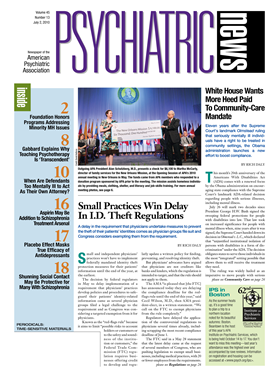Individualized treatment, based on analysis of individual patient genetic polymorphisms, is the future for the treatment of depression.
So said Charles Nemeroff, M.D., Ph.D., at APA's 2010 annual meeting in May in New Orleans. He presented recent data on genetic polymorphisms in components of the serotonin, dopamine, and norepinephrine transmitter systems as well as the cortocotropin-releasing-factor (CRF) system that have been found to be associated with variable treatment response to different classes of medication.
The findings promise to enable clinicians to match treatments to genetic subtypes. “We hope in the near future to be where infectious disease and oncology are in [terms of] individualized treatment,” Nemeroff said. “We should be able to see patients, study them in terms of their genomics, characterizing them biologically, then match them to a particular treatment regimen.
“That's what we do in oncology, and there is no reason why we can't do it in psychiatry,” he said. “Ten or 20 years from now, we will be sending our patients to the laboratory to characterize them in terms of genetic polymorphisms and/or to an imaging laboratory. Then based on those findings, and on the clinical presentation of the patient, we will be able to do what we can't do right now, which is to answer the question—of all the treatments that are effective for depression, what is the best one for this particular patient?”
Nemeroff is the Leonard M. Miller professor and chair of psychiatry at the University of Miami Miller School of Medicine. Nemeroff's remarks were part of a three-hour symposium that included presentations on augmentation and combination strategies in the treatment of depression by Linda Carpenter, M.D., and management of comorbid depression and substance abuse by Ihsan Salloum, M.D., M.P.H.
Reviewing the function of serotonin in depression, Nemeroff explained that neuroimaging has shown that some, though not all, patients with depression have a reduction in binding of the serotonin transporter in the mid-brain raphe neurons. “I would suggest to you that these patients are likely the SSRI responders.”
He added that different polymorphisms of the serotonin transporter (5-HTT) gene render individuals more or less susceptible to depression: patients with a short arm of the transporter gene express fewer serotonin transporters. He cited a now-famous report by Avshalom Caspi, Ph.D., that found that individuals with the short allele were highly susceptible to depression in the face of early childhood trauma, while those with the long allele experienced a protective effect.
(That study, “Influence of Life Stress on Depression: Moderation by a Polymorphism in the 5-HTT Gene,” appeared in the July 18, 2003, Science.)
Similar findings exist for dopamine, and Nemeroff described postmortem studies in suicide victims showing a reduction in dopamine transporters in the amygdala and a compensatory increase in postsynaptic D2/D3 receptors. Moreover, while studies of normal volunteers aged 18 to 55 show an age-related reduction in dopamine transporters, depressed patients exhibit a lower density of transporters across the age range than do healthy comparison subjects.
Nemeroff also presented data from two of his studies finding variable treatment response to antidepressants based on polymorphisms in the norepinephrine transporter gene and in genes regulating the corticotropin-releasing-factor system.
The latter study, “Association of Polymorphisms in Genes Regulating the Corticotropin-Releasing Factor System With Antidepressant Treatment Response,” was published in the April Archives of General Psychiatry. The study analyzed the association of genetic variants in 10 genes that regulate the CRF and arginine vasopressin systems with treatment response to citalopram using data from the Sequenced Treatment Alternatives to Relieve Depression (STAR*D) study.
It found that one single-nucleotide polymorphism in the CRF system showed a significant association with both remission and reduction in depressive symptoms in response to citalopram.
And a September 2004 report in the American Journal of Psychiatry showed a variable response to milnacipran—an agent now approved for the treatment of fibromyalgia and, in some countries in Europe, for depression—based on polymorphisms in the norepinephrine transporter gene.
In that study, 96 Japanese patients with major depressive disorder were treated with milnacipran, 50mg/day to 100 mg/day, for six weeks. The presence of one specific polymorphism of the NET gene was associated with a superior antidepressant response, whereas another polymorphism was associated with a slower onset of therapeutic response.
“This is where the future of psychiatry is going,” Nemeroff said. “The task before us is very large because each of these subtypes of depression is biologically distinct and will have different predictors of treatment response. But there is no doubt that what we will be able to do is end this interminable trial-and-error method that all of us are stuck with treating depressed patients.”
